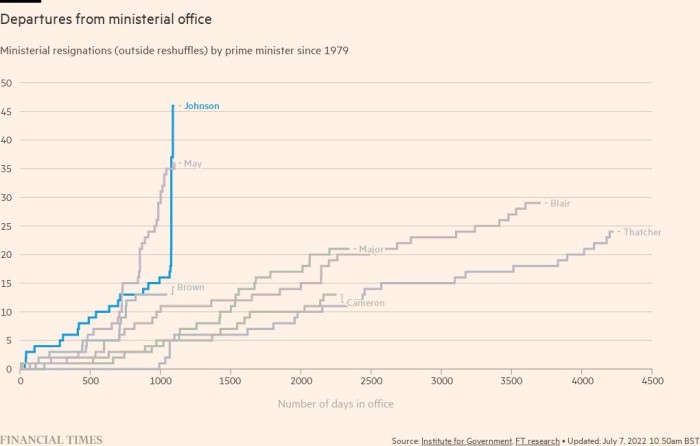[ad_1]
Boris Johnson’s turbulent three-year premiership was nearing its end on Wednesday night after he was urged to quit by a delegation of his closest cabinet allies on a night of chaos in Downing Street.
As his premiership hung by a thread, Johnson retaliated by sacking Michael Gove, one of the ministers who told the prime minister to go, according to allies of the levelling up secretary.
The UK prime minister was warned that unless he stepped down there would be further cabinet resignations, followed by an inevitable humiliating defeat by Tory MPs in a no-confidence vote next week.
Gove had been the first minister to tell Johnson to step down. One individual with knowledge of the conversation said: “Michael essentially told him that it’s time to go — it’s over.”
But Johnson told ministers he would fight on, effectively daring them to resign, and warned that if he quit there would be a chaotic Tory leadership contest in the midst of an economic crisis.
Johnson’s power drained away during the course of a dramatic day, which saw more than 35 government resignations and many more Tory MPs denounce his character and integrity.
It ended with the PM being confronted in Downing Street by once-loyal cabinet ministers — including newly appointed chancellor Nadhim Zahawi — and being told to resign with dignity. “The game’s up,” said one minister.
Even Priti Patel, the home secretary closely associated with Johnson’s tough immigration policy, told him the mood of the party had swung strongly against him and he should go, according to government insiders.
But Downing Street insiders said Johnson would not resign, pointing to his 2019 election mandate, adding that he was preparing to fill vacancies left by resigning ministers and would set out a new economic plan, including the offer of tax cuts, with Zahawi next week.
Johnson said that if he quit there would be pressure for an early general election, which the Tories would be certain to lose, according to those briefed on the tense discussions with ministers.
After months of criticism of Johnson over his leadership and integrity — focused on his handling of the partygate affair — the deterioration of the prime minister’s authority has been swift.
The final straw for many was Johnson’s untruthful account of what he knew about the past sexual misconduct of Chris Pincher, whom he appointed deputy chief whip in February and who quit in disgrace last week after drunkenly groping two men in a private member’s club.
Sajid Javid, who quit as health secretary on Tuesday, questioned Johnson’s “truth and integrity” and deplored the fact that ministers were being sent out to defend positions that did not “stand up” to scrutiny. In a powerful resignation speech, he told MPs: “Enough is enough.”
Many other ministers and Tory MPs have reached the same conclusion and Chris Heaton-Harris, chief whip, was among those who told Johnson that he would now lose a confidence vote, which could come early next week.
Grant Shapps, the transport secretary who has advised Johnson on parliamentary arithmetic in the past, warned he had “little chance” of winning the vote and should resign with dignity.
Rumours swirled at Westminster that more cabinet ministers would resign if Johnson refused to quit, but none had done so by 9pm on Wednesday. Shapps’ allies said he had not resigned, but that the situation could change.
Elections to the executive of the backbench Tory 1922 committee will take place next Monday, with the expectation that the new team will change party rules to allow an immediate confidence vote.
The prime minister cut a diminished figure at question time in the House of Commons, where he insisted he would “keep going” — but to near silence from Conservative MPs behind him.
Johnson, who became prime minister less than three years ago, insisted he had secured a “colossal mandate” from voters in the December 2019 election.
But throughout the day, ministerial resignations poured in, raising questions about whether Johnson would be able to find enough Tory MPs willing to fill the vacancies left.
Loyal ministers including Shapps, Kwasi Kwarteng, the business secretary, and Northern Ireland secretary Brandon Lewis later told Johnson he should quit before things got worse.
Nadine Dorries, culture secretary and an ultra-loyalist, and Jacob Rees-Mogg, Brexit opportunities minister, are said by government officials to have urged Johnson to fight on.
On Wednesday night Johnson was in talks with his closest advisers in Downing Street, as his premiership hung by a thread.
Sir Keir Starmer, Labour leader, appeared to acknowledge that Johnson’s departure was a foregone conclusion, attacking his potential successors as “a Z-list cast of nodding dogs”.
One member of the 1922 executive said MPs wanted a leadership contest to begin as soon as possible to have a new leader to replace Johnson by the autumn.
[ad_2]
Source link


